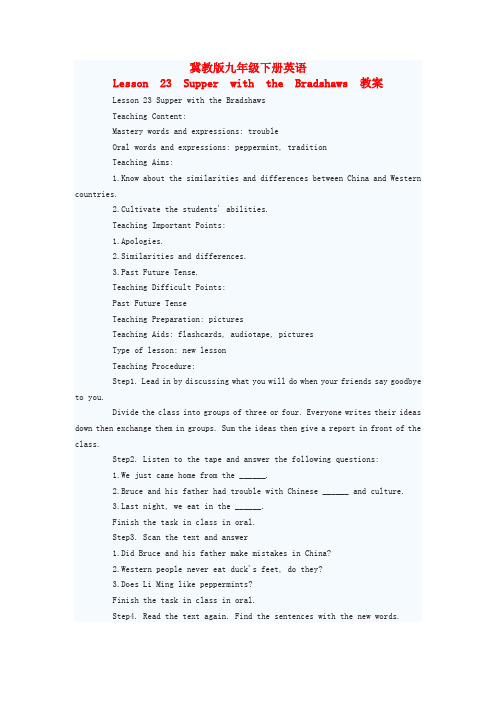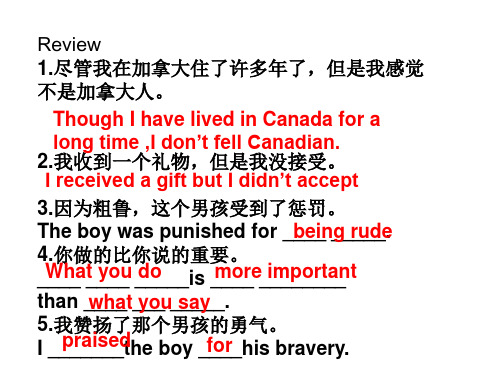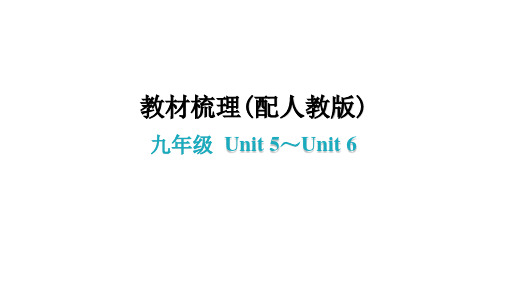第23课时 九年级下册 Modules 5~6
英语九年级下冀教版lesson23教案

冀教版九年级下册英语Lesson 23 Supper with the Bradshaws 教案Lesson 23 Supper with the BradshawsTeaching Content:Mastery words and expressions: troubleOral words and expressions: peppermint, traditionTeaching Aims:1.Know about the similarities and differences between China and Western countries.2.Cultivate the students' abilities.Teaching Important Points:1.Apologies.2.Similarities and differences.3.Past Future Tense.Teaching Difficult Points:Past Future TenseTeaching Preparation: picturesTeaching Aids: flashcards, audiotape, picturesType of lesson: new lessonTeaching Procedure:Step1. Lead in by discussing what you will do when your friends say goodbye to you.Divide the class into groups of three or four. Everyone writes their ideas down then exchange them in groups. Sum the ideas then give a report in front of the class.Step2. Listen to the tape and answer the following questions:1.We just came home from the ______.2.Bruce and his father had trouble with Chinese ______ and culture.st night, we eat in the ______.Finish the task in class in oral.Step3. Scan the text and answer1.Did Bruce and his father make mistakes in China?2.Western people never eat duck's feet, do they?3.Does Li Ming like peppermints?Finish the task in class in oral.Step4. Read the text again. Find the sentences with the new words.But he and his father sometimes had trouble with Chinese customs and culture.At the end of the meal, Mr. Bradshaw opened a box of peppermint candies.In good Chinese tradition, I told him that I enjoyed it.Show some pictures to help the students remember the new words.Step5. Act it out.Divide the class into several groups. Ask each group to act one part of the text out. Before doing this, let them read the text fluently and decide which part to act it out.If they don't have real peppermints or something they must use, they can use something else to replace them.Step6. Come to “LET'S DO IT”.Divide the class into groups. Ask them to discuss what makes them embarrassed when they are guests at a dinner. Everyone writes his ideas down. Then exchange them in groups. At last, one of the groups sums the group's ideas and presents it in front of the class.They can write a diary entry, an e-mail or a letter about the dinner.Step7. Homework1.Finish off the exercises in the activity book.2.Go on the next reading in the student book.Summary:It is not easy to make friends with foreigners. It is helpful to know more about the differences between Chinese and western customs and culture. Acting the text out is interesting. The teacher can ask the students to bring something useful into the class. If they don't have real ones, they can use something to replace it.。
外研版英语九年级 初三下册 Module 5 Unit 1 课文原文,翻译与知识点

Module 5 Unit 1 课文原文,翻译和知识点1 Look at the picture and answer the questions.I . Do you think the person is seriously hurt?2. What do you think has happened to him?2. Listen and answer the questions.1. Has Tony's dad ever had an accident?2. How long did it take for the wound to get better after Tony's dad cut off his finger?3 What parts of his body hurt afer Tony’s dad fell off his bike.4.What is Tony reading about for his school trip?Listen and read.Betty: I'm tired, Mr Jackson.Mr Jackson: Let's wait for the others. They 'll catch up in a few minutes.Betty: Who's missing?Mr Jackson:Tony and Daming. They're always at the back of the group. I thought we had an agreement to stay together. Betty: They were walking more slowly than usMr Jackson: I think it's going to rain. I'll go back and look for them.Tony: (Moving closer) Help! It's Daming. He's had an accident. He fell over when was running down the steps. He's hit his headand his leg hurts. I think he's broken his leg.Mr Jackson: When did he fall?Tony: About ten minutes agoMr Jackson: OK, show me where he is.. There he is! Hey. Daming, how do you feel?Daming: My leg hurts, and I can't see very well. Will I go blind? Mr Jackson: No, you,ve just hit your head. You've cut your knee too. There's blood on your leg. Can you move your foot? Daming: Yes. Ouch! But I can’t walk.Mr Jackson: We’d better get you to hospital. I'll call for help on my mobile.Daming: Is it serious? Will I live?Mr Jackson: Of course you will! It's nothing serious. Tony, tell everyone we have to call off the walk and go back home.译文:贝蒂:我累了,杰克逊老师。
中考宁夏专用英语人教版教材复习课件九年级全册Units-5-6

3.The wine is made __fr_o_m__ grapes and it's made __i_n___ France. 4.The bottle is made ___o_f__ glass. 5.The wood can be made ___in_t_o_ some chairs. 6.The model plane is made __b__y__ my brother.
谈论发明物的历史 4.—When was the zipper invented? 拉链是什么时候发明的? —It was invented in 1893. 它是1893年发明的。
5.—Who was it invented by? 它是谁发明的? —It was invented by Whitcomb Judson. 它是惠特科姆·贾德森发明的。 6.—What is the hot ice-cream scoop used for? 这个热冰激凌勺子是用来做什么的? —It's used for serving really cold ice-cream. 它是用来盛很凉的冰激凌的。
1.(2020·恩施改编)Labor can create wealth and at the same time beauty _i_s _m_a_d__e_ (make) by labor,too. 2.(2020·连云港)Tom bought a toy car yesterday.The wheels of it __a_r_e__m_a_d_e__o_f_w_o_o_d___ (是由木头制成的).
26.doubt n.疑惑;疑问v.怀疑
27.fridge n.冰箱
28.translate v.翻译
九年级英语下册lesson23课件(PPT)4-4

德罗常量】āfújiādéluóchánɡliànɡ指1摩任何物质所含的分子数,约等于6。022×1023。因纪念意大利化学家阿伏伽德罗(AmdeoAvogadro)而得名。旧称 阿伏伽德罗常数。 【阿公】āɡōnɡ〈方〉名①丈夫的父亲。②祖父。③尊称老年男子。 【阿訇】āhōnɡ名我国伊斯兰教称主持清真寺教务和讲授经典的人。 [波斯ākhūnd] 【阿拉伯人】ālābórén名亚洲西;网址导航 https:/// 网址导航 ;南部和非洲北部的主要居民。原住阿拉伯半岛,多信伊斯兰 教。[阿拉伯,阿拉伯语Arab] 【阿拉伯数字】ālābóshùzì国际通用的数字,就是0,1,2,3,4,5,6,7,8,9。最初由印度人发明、使用,因后经阿拉 伯人传入欧洲,所以叫阿拉伯数字。 【阿兰若】ālánrě名见809页〖兰若〗。 【阿罗汉】āluóhàn名见899页〖罗汉〗。 【阿猫阿狗】āmāoāɡǒu〈方〉泛指 某类人或随便什么人(含轻蔑意)。 【阿门】āmén古代犹太教、基督教祈祷时常用的结束语,“但愿如此”的意思。[希伯来āmēn] 【阿片】āpiàn名从 尚未成熟的罂粟果里取出的乳状液体,干燥后变成淡黄色或棕色固体,味苦。医上用作止泻和镇痛。常用成瘾,是一种度品。用作度品时,叫鸦片。 【阿婆】
外研版九年级英语下册教案:Module5Lookafteryourself

今天的学习,我们了解了健康生活方式的基本概念、重要性和应用。同时,我们也通过实践活动和小组讨论加深了对健康与安全知识的理解。我希望大家能够掌握这些知识点,并在日常生活中灵活运用。最后,如果有任何疑问或不明白的地方,请随时向我提问。
五、教学反思
在今天的教学过程中,我发现学生们对Module 5 Look after yourself这一章节的内容表现出了浓厚的兴趣。他们在讨论健康生活方式、紧急处理方法以及个人安全等方面都非常积极。以下是我对今天教学的几点反思:
-语言点:一般现在时态、情态动词should的用法。
2. Unit 2:学习如何处理紧急情况,如生病、受伤等。
-知识点:常见疾病、急救措施、就医流程。
-语言点:一般过去时态、被动语态。
3. Unit 3:探讨如何保护个人安全,避免危险。
-知识点:网络安全、交通安全、防火安全等。
-语言点:祈使句、情态动词can的用法。
首先,通过提出与生活密切相关的问题导入新课,成功引起了学生的好奇心。这使得他们在接下来的学习中,能够更加投入和专注。在今后的教学中,我将继续采用这种贴近生活实际的方态动词的用法掌握程度不一。在讲解过程中,我尽量用简洁明了的语言进行解释,并通过大量实例来帮助学生理解。但我也意识到,对于这部分知识,还需要在后续的教学中不断巩固和强化。
在小组讨论环节,我尝试扮演了一个引导者和参与者的角色,与学生共同探讨问题。这种教学方式使得课堂氛围更加轻松愉快,有助于学生发挥主观能动性。今后,我将继续采用这种教学策略,鼓励学生积极参与课堂讨论。
然而,今天的教学也存在一些不足之处。例如,在总结回顾环节,时间安排得有些紧张,导致部分学生没有足够的时间消化所学知识。在今后的教学中,我将注意调整课堂节奏,确保学生在每个环节都有充分的思考和吸收时间。
2021年广东中考英语人教版教材梳理 九年级 Unit 5~Unit 6

7. 突然;猛地 ____a_l_l _o_f _a_s_u_d_d_e_n___________ 8. 错误地;无意中 ___b_y__m__is_t_a_k_e______ 9. 把……分开 ___d_iv_i_d_e_…___in_t_o___________ 10. 不但……而且……___n_o_t_o_n_l_y_…___b_u_t_a_l_s_o_…_________ 11. 钦佩;仰慕 ____l_o_o_k__u_p_t_o_______________
A. of; in
B. from; of
C. from; in
D. in; from
考点2
no matter的用法
【例句】No matter what you may buy, you might think those products were made in those countries. 无论你买什么东西,你可 能会认为那些产品产自那些国家。 (Unit 5)
27. 地震 __e_a_rt_h_q_u_a_k_e
28. 顾客 __c_u_st_o_m__e_r_
29. 加拿大的 _C__a_n_a_d_ia_n__
30. 分开;分散 __d_iv_i_d_e____
词形变化
1. France (n.)法国—___F__r_en__ch__(n.)法国人; 法语(adj.) 法国 人的; 法语的; 法国的 2. nation (n.)国家—___n_a_t_io_n__a_l (adj.) 国家的; 民族的— ____in_t_e_r_n_a_t_io_n_a_l_____(adj.) 国际的 3. live (v.)居住;生活—____a_l_iv_e___(adj.)活着; 有生气的— _____li_v_e_ly__(adj.) 生气勃勃的; (色彩) 鲜艳的
安徽省2019届中考英语总复习第二十三讲九下Modules5_8精练(含新题)(新版)外研版
第二十三讲九年级(下) Modules 5—8一、单项填空1.[2018合肥蜀山区二模]This is a moving story about a girl saved her mother's life.A. whichB. whoC. whoseD. whom2.[2018安庆一模]—How did you feel at the top of the mountain?—The air on the top was much than that at the foot of the mountain. A. fatter B. easierC. thinnerD. slower3. her help, I've made great progress in English.A. Such asB. Instead ofC. Thanks toD. Thanks for4.The old man is because his eyes were damaged(受损伤的)when he was a little boy.A. deafB. blindC. uglyD. bright5.You should give up smoking, or it will your health.A. protectB. harmC. improveD. develop6.The flowers some water because they haven't been watered for a few days.A. requireB. reachC. prepareD. order7.—Do you think Class 4 will beat Class 6 in the next match?—Yes, they have better players, so I them to win.A. adviseB. allowC. expectD. ask8.If you play computer games all day long, your mother will be .A. satisfiedB. crossC. movedD. excited9.—The dish is delicious! What was it ?—Meat and beans.A. made ofB. made inC. made fromD. made up10.—Do you know the reason he didn't finish the work on time?—Sorry, I don't know.A. whichB. whyC. thatD. what二、完形填空People in different countries have different ways of doing things. Something that is 1 in one country may be quite impolite in another. In Britain, you mustn't lift your bowl to your 2 when you are having some liquid food. But it's 3 in China. And in Japan you even needn't worry about making 4 when you have it. It shows that you are enjoying it. But it is regarded as bad manners in Britain. If you are a visitor in Mongolia, what manners do they wish 5 to have? They wish you to give a loud "burp" (打嗝声) 6 you finish eating. Burping shows that you like the food.In Britain, you should try not to 7 your hands on the table when you're having a meal. In Mexico, however, guests are expected to keep their hands on thetable during a meal. But in Arab countries you must be very careful with your hands. You 8 eat with your left hand. The Arabs consider it very 9 manners eating with left hands. So when you are in other countries, 10 carefully and follow them.1.A. bad B. useful C. terrible D. polite2.A. mouth B. nose C. ears D. eyes3.A. same B. differentC. importantD. difficult4.A. faces B. soundsC. mistakesD. friends5.A. them B. her C. you D. him6.A. after B. before C. if D. until7.A. give B. take C. bring D. put8.A. needn't B. mustn't C. should D. may9.A. different B. creative C. useful D. bad10.A. see B. look C. read D. listen三、补全对话Dan: Hey, Eric, what a surprise!Eric: 1Dan: How are you?Eric: Not so good. 2 Ouch!Dan: Is it because of the holes in your teeth?Eric: Yes. I think I will have to have my two teeth pulled out.Dan: 3Eric: Hey, what are you here for?Dan: Well, my mum has got some holes in her teeth. 4Eric: I see. Oh, the nurse is calling my name. 5Dan: See you. Hope you will be better soon.Eric: Thanks.四、阅读理解AThis is not a diet. It's a simple way to lose weight. And you don't even have to give up the food you love.You just need to follow some habits that thin people have. Keep the habits, and you'll become thin.Wake-upWhen you wake up in the morning, sit up slowly without using your hands. With legs straight out, bend (弯曲) forward until you feel sore in your back. It will burn about 10 calories.Start with soupWhen you have a meal, order some soup, and have it before having the main food. In this way, you'll feel full, so you'll eat less when the main food comes.An apple (or more) a dayApples are full of fiber (纤维) and water, so your stomach will want less food. The study shows that people who eat at least three apples a day can lose weight.Stand up and walk aroundEvery time you use the mobile phone, stand up and walk around. Fat people sit on average (平均) two and a half hours more each day than thin people. This skill is very important, as standing up and walking around will burn 50 or more calories.Use these skills, and you will have a big weight loss.1.What should we have first if we want to eat less main food?A. Soup.B. Ice cream.C. Salad.D. Cheese.2.Why does eating apples make one's stomach want less food?A. Because apples are delicious.B. Because apples are full of fiber and water.C. Because apples are sour.D. Because only apples are filled with calories.3.Which of the following may the author disagree?A. Sitting up slowly without using your hands helps burn calories.B. Eating apples every day is good for people's health.C. You have to go to the gym(健身房) if you want to lose weight.D. It's good to walk around while using the mobile phone.4.What's the purpose of the passage?A. To give some advice on how to lose weight.B. To advise people to eat apples every day.C. To tell people how to enjoy a better life.D. To advise people to give up bad habits.5.In which part of a newspaper would you most probably read the passage?A. Shopping.B. Education.C. Family.D. Health.BChris is not a traditional explorer(探险者). Yet his job can sometimes be just as exciting and dangerous as being an explorer.Chris works for MSF, an organization also known as Doctors Without Borders (无国界医生). MSF sends trained doctors all over the world to help people after a war or a disaster. Chris is a doctor from France who has travelled to many places to organize programs that help people.At the moment, there are over 27,000 trained medical doctors taking part in MSF projects and tasks. The organization received the Nobel Peace Prize in 1999. All kinds of doctors can volunteer for MSF. They need to be prepared to go almost anywhere in the world and, of course, they should expect difficult conditions. Doctors with experience in tropical(热带的)diseases are especially useful because most of MSF's work is in Africa. When MSF accepts a doctor for a task, he has to go for at least six months. When doctors have completed a few tasks, they might be sent for another task following a disaster, such as an earthquake.But why would a doctor leave a comfortable life to join MSF? According to Chris, the experience you gain is a great help in your career. Besides, just like the explorers of the past, you need to keep an open mind and learn to mix well with thepeople you meet. Most importantly, at the end of each task, you have made a real difference to people's lives.6.What is an MSF doctor's job like?(不超过5个词)7.How many medical doctors are taking part in MSF projects and tasks?(不超过5个词)8.According to Chris, why is his work important to other people?(不超过10个词)五、书面表达假定你是李华,你校的交换生Tom对中国的民间艺术很感兴趣,本周五学校将举办"校园文化节",请你写一封电子邮件,邀请Tom去体验剪纸艺术,内容包括:1.提出邀请并简述原因;2.活动内容(持续两小时;了解剪纸的历史;专家讲解;观看剪纸展览;各种剪纸的展示);3.约定Tom见面的时间和地点;4.期待对方回复。
初中中考英语总复习讲义课件 教材复习 九年级全册Units 5-6
31.earthquaken.地震
32.souradj. 酸
的;有酸味的
33.cusidev. 分
开;分散
重点短 1语.bemadeof/from由……制成 2.beknownfor以……闻名;为人知晓 3.byhand手工 4.nomatter不论;无论 5.papercutting剪纸 6.beusedfor被用来 7.haveapoint有道理 8.byaccident偶然;意外地
9.takeplace发生;出现 10.withoutdoubt毫无疑问;的确 11.translate...into... 把……译成…… 12.allofasudden突然;猛地 13.bymistake错误地;无意中 14.divide...into把……分开 15.notonly...butalso... 不但……而且…… 16.lookupto钦佩;仰慕
短语
含义
例句
由……制成 be made of+材
(看得出原材 料
料)
The table is made of wood. 这张桌子是用木头制成 的。
由……制成 be made from+
(看不出原材 材料
料)
Paper is made from wood. 纸是用木材制成的。
短语
含义
例句
be made into+ 成品
九年级全册Units5-6
1 知识盘点夯基提能 2 考点梳理过重难点 3 语法突破精讲精练
知识盘点夯基提能
重点单词 Unit5 1.chopstickn.筷子 3.forkn.餐叉;叉子 制造;出产 5.processv.加工;处理n.过程 本地的 7.avoidv.避免;回避 提包
2022年人教版中考英语总复习 第一部分教材知识梳理 九年级(全)Units 5-6
教材词汇分层训练
熟词生义
名师考点精讲
安徽中考真题精选
-13-
九年级(全)Units 5-6
15.without doubt毫无疑问;的确
16.all of a sudden突然;猛地
17.by mistake错误地;无意中
18.for fun为了好玩
19.the Olympics奥林匹克运动会
20.divide...into把……分开
教材词汇分层训练
熟词生义
名师考点精讲
安徽中考真题精选
-6-
九年级(全)Units 5-6
34.customer n.顾客;客户 35.divide v.分开;分散 36.basket n.篮;筐
教材词汇分层训练
熟词生义
名师考点精讲
安徽中考真题精选
-7-
九年级(全)Units 5-6
1.glass n.玻璃;玻璃杯→ glasses (复数形式)n.眼镜 2.leaf n.叶;叶子→ leaves (复数形式) 3.produce v.生产;制造;出产→ product n.产品;制品→
教材词汇分层训练
熟词生义
名师考点精讲
安徽中考真题精选
-4-
九年级(全)Units 5-6
21.daily adj.每日的;日常的 22.website n.网站 23.pioneer n.先锋;先驱 24.list v.列表;列清单 n.名单;清单 25.mention v.提到;说到 26.doubt n.疑惑;疑问 v.怀疑
教材词汇分层训练
熟词生义
名师考点精讲
安徽中考真题精选
-12-
九年级(全)Units 5-6
7.paper cutting剪纸 8.be turned into被变成…… 9.send out发出;分发 10.in trouble遇到麻烦;处于困境 11.with pleasure没问题;乐意效劳 12.have a point有道理 13.fall into掉进……里 14.take place发生;出现
外研版英语(新标准)九年级下册《Module 6 Eating together》教学设计
Step3:
Read the passage in different roles.
1.Read the story in different roles.
Boys = Daming&Tony
We’re all invited.
I was chosen to play the dance music.
I was asked to bring some balloons...
It should be cooked at home.
It’s made with chicken and vegetables.
提高学生们的听力。
二、难点:
能用已经学过的被动语态讨论聚会计划。
教学辅助
多媒体、课本、黑板
教学策略
任务型教学法,交际教学法
教学内容
教学活动Warming-up:Let’s talk!
Is there a school-leavers’party in your school?
课型:阅读
第二单元的课文讲的是西方的用餐习俗。在餐饮习惯的介绍方面,按照开始用餐、进餐过程、用餐结束的顺序进行说明,对于用餐行为和言语的习惯,则同时进行介绍。这有助于读者按照用餐过程学习、掌握这些建议。
课时教学目标
一、核心内容
(一)核心词汇:serve,similar, wing, lady, gentleman, help yourself
二、正确掌握已经学过的被动语态的用法。
三、能用已经学过的被动语态讨论聚会计划。
教学辅助
多媒体、课本、黑板
